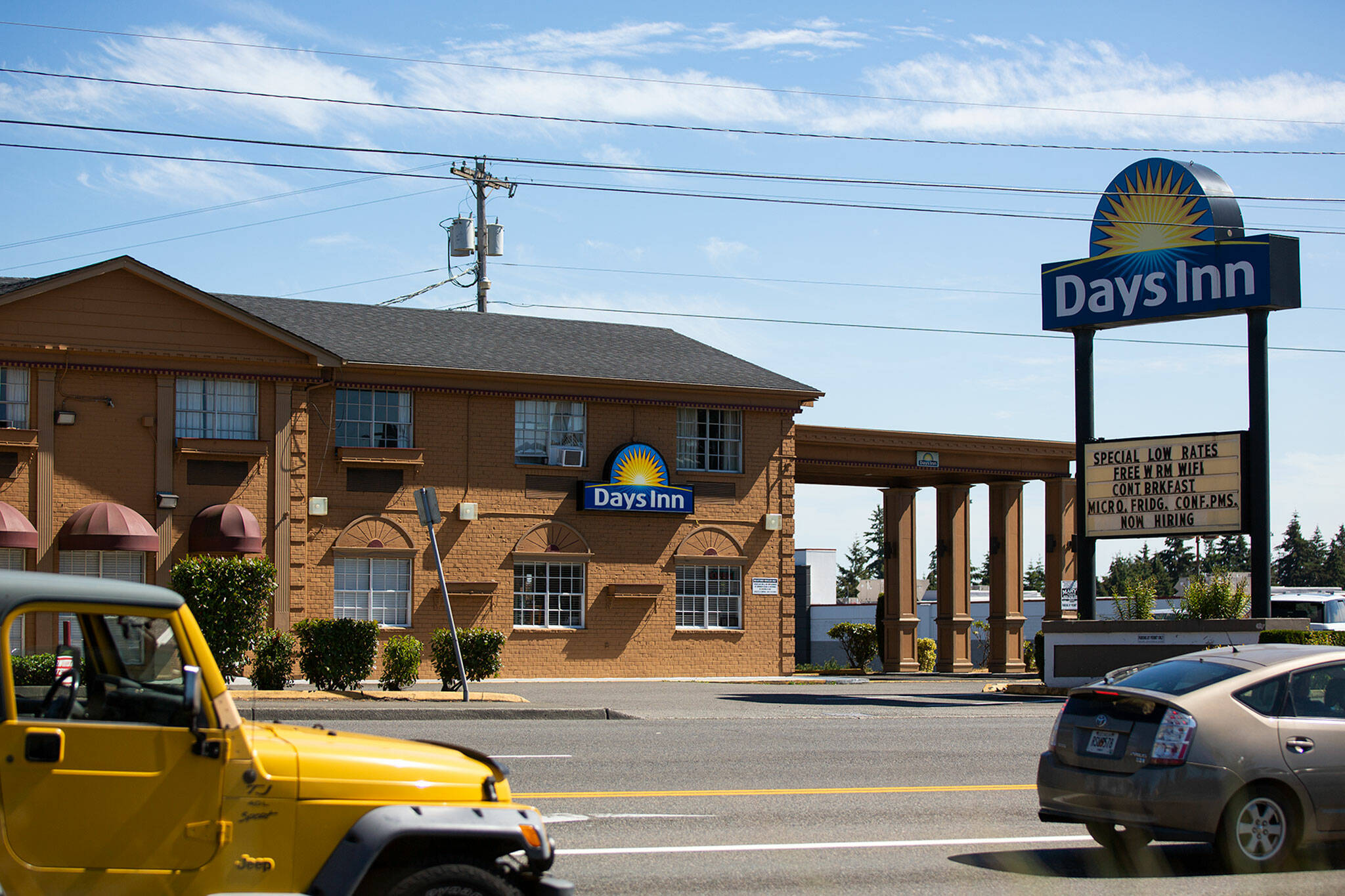EVERETT — After more than hour of public testimony, the Snohomish County Council again shot down a proposal that would have required drug treatment programs as a condition for living in two new county shelters.
In August, Snohomish County Executive Dave Somers had proposed converting the Days Inn in Everett and Americas Best Value Inn in Edmonds into low-barrier transitional housing, using $19.9 million in one-time pandemic relief funds from the American Rescue Plan Act.
County Council member Nate Nehring pushed to delay the hotel purchases, to allow for a public discussion on whether the county should require drug treatment for residents. Nehring’s motion failed in August, and the council voted 3-2 to move ahead with Somers’ “Housing First” plan.
Nehring then moved to amend the shelter plan, arguing housing services at county-owned hotels must include “code of conduct requiring a participant with a substance use disorder to participate in chemical dependency treatment services.”
This week, the council hosted a public hearing on the proposal.
Twelve people supported requring treatment, four were against and two suggested compromises.
Eric Nelson co-owns Lynnwood Honda across the street from Americas Best, which is already being used to shelter people through a county voucher program.
“Crime is rampant. EMT, fire and police are there weekly,” Nelson said. “We’ve had crack cocaine consumed in our bathrooms. We have needles in our landscaping. … This property is meant to serve everyone, and there is no way a single mom with kids would ever go into that hotel in the condition it’s in and the current tenants that are occupying it.”
Nelson supported the treatment requirement, saying, “I’ve been in recovery for 19 years, and I didn’t go into it willingly.”
State Rep. Lauren Davis, D-Shoreline, spoke against the amendment.
“When you treat a person with worth and dignity, when you give them a place to stay and a blanket, and you call them by their name, and you look them in the eye,” Davis said, “that is the place form which recovery flows. And if you require treatment out of the gate — because people are so fearful and they have such a shattered sense of self worth — they won’t enter treatment at all.”
“Housing First” or “low-barrier” homeless shelters prioritize providing shelter first, then addressing issues of drug use or mental health with discretion. The philosophy is that getting people into a safe and stable environment is the most important step to recovery.
Several studies have suggested it’s far more effective at reducing homelessness, according to the National Low Income Housing Coalition and the National Alliance to End Homelessness.
Critics counter that people need to be held accountable and commit to getting sober.
“Overcoming addiction is a difficult path and I recognize that there may be bumps along the way,” Nehring said. “The important thing is that we have expectations for these individuals, which reflect their dignity, and for me that includes a focused commitment to sobriety and self-improvement.”
County Council Chair Megan Dunn said mandating treatment in exchange for housing would jeopardize $20 million in federal funding due to discrimination.
“We know that people who have substance use disorder have a medical condition,” Dunn said. “Just as you can’t discriminate against someone by denying them housing because of a medical condition, such a diabetes or a physical disability, you also can’t deny people trying to find housing services and a safe place to live because of their substance use disorder.”
Edmonds resident Janelle Cass, a Republican running for state Senate, offered a compromise. Cass suggested using one hotel as a “Housing First” facility and the other facility can require treatment. After some time, she argued, the county can decide which approach works best.
Marysville City Council member Mark James, also a Republican running for state House, offered another compromise: Allow people to move into the shelter without any barriers, with a grace period after which they must enroll in treatment.
The hearing ended with a 3-2 vote along party lines, mirroring August’s vote to buy the hotels.
“If this is the direction the county is going to go, I’ll say I hope it is successful,” Nehring said. “I hope we find that through this approach we can help a significant number of people overcome their addictions.”
He added that if it doesn’t go well, he hopes the council will reconsider the amendment.
The two properties create 129 units for those without shelter. Each unit will cost the county about $154,264.
Kayla Dunn: 425-339-3449; kayla.dunn@heraldnet.com; Twitter: @KaylaJ_Dunn.
Talk to us
> Give us your news tips.
> Send us a letter to the editor.
> More Herald contact information.


























